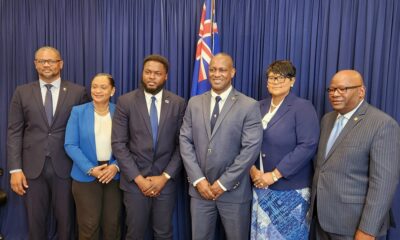#TurksandCaicos – February 19, 2018 – Members of Parliament are honourable because they have the outstanding privilege of representing a district or constituency of people in the House of Representatives. It is something that, in the Turks and Caicos Islands, is decided about every four years but is a democratic tradition of practicality more than anything else; at least that is how I understand it.
Since there are some 1,159 (2017) voters in Cheshire Hall and thousands more people who are actually resident in what is the largest voting constituency in these islands; it is practical for the electorate to send one man or woman to take up the seat in parliament to represent their views in the House of Assembly.
One thousand, one hundred and fifty-nine people simply cannot fit inside the halls of parliament and so we send one to be the representative.
It is how this and other democracies work, pretty much. 
Although North and Middle Caicos are one of the smallest voting districts in the Turks and Caicos with 532 (2017) registered voters, still, all of those men and women – if they could even get to Grand Turk for a House of Assembly meeting – would not be able to squeeze into the one seat the TCI legislature provides to reflect that constituency.
So yes, it is physically impossible for everyone to be represented individually in a parliament anywhere in the world. It can also be argued that it is likely too expensive, cannot be accommodated by air, sea or ground transportation operators and an unreliable expectation when you are trying to get country business done, as some of us just won’t turn up anyway.
The reality is that 7,970 (2017) voters cannot all fit onto the plane or boat or in taxis and travel to the House of Assembly each time a convening takes place. The reality also is that if we all managed to get to Grand Turk, only 30 of us could fit in the seating on ‘the Floor’ where debate on bills and the like takes place and even the guest galley would be maxed out at around 120 people.
The same is true of South Caicos, which the 2017 Voter Register reveals there are 358 on the elector’s list.

So, Doug and Ralph and Ruth – for example – are expected to show up every time there is a meeting at the House of Assembly, unless there is a good reason for an absence. Doug and Ralph and Ruth – again for example – are also expected to take their role seriously and humbly carry the responsibility or else voters could decide to find someone else to do the job in four years. And Doug and Ralph and Ruth – as again an example – ought to know what their constituents think and feel and want on any given policy proposal or issue and represent that when and as opportunities present themselves.
In case you did not know it, the Member of Parliament or District Representative has allegiance first to the voter because that is who hired him or her; not the political party.
Also interesting to note about the role of a Member of Parliament is that in the House of Assembly, these honourable people are never, ever, ever supposed to be referred to by their own names. The reason is quite profound and I think, ingenious.
Doug and Ralph and Ruth – for instance – are important as human beings, undoubtedly; however who they are individually is irrelevant in a House of Assembly. These three individuals and the other 20 people who make up the Turks and Caicos Parliament are there not because of who they are individually, but because of who or what they represent.
Doug is called the Member for Cheshire Hall and Richmond Hill – that is his name in the House.

Ralph is called the Minister of Tourism and the Member of Parliament for North and Middle Caicos – that is his name in the House.
Ruth is called the Member for South Caicos because that is her name in the House.
They are the people, because we cannot all fit.
The representatives, even those with the huge job of being All Island Members are there because they represent PEOPLE. It is the people who entrusted them with the popular vote and put them there. It is the people who will be impacted by the policies being debated. It is the people who must be represented because they have given these former candidates, now elected representatives the honour to do so.
The MP is proxy for the Voters.
I reiterate, because, we cannot all fit – Doug and Ralph and Ruth and others are sent you to honour our wishes by vocalising them as we build this nation.

In understanding that the House of Assembly is therefore the forum for all citizens’ perspectives to show up or be spoken out loud on any matter, the looming question always is – are we absent or are we present?
Maybe it is time to begin talking more to Doug or Ralph or Ruth – for example, to make sure it is your constituency and not them showing up when the House is in session.


 Caribbean News1 week ago
Caribbean News1 week ago
 Caribbean News1 week ago
Caribbean News1 week ago
 Caribbean News1 week ago
Caribbean News1 week ago
 Caribbean News1 week ago
Caribbean News1 week ago
 Bahamas News1 week ago
Bahamas News1 week ago
 News1 week ago
News1 week ago
 News1 week ago
News1 week ago
 News3 days ago
News3 days ago




























